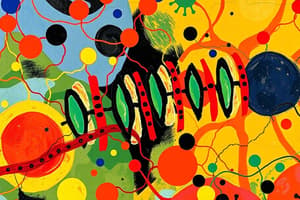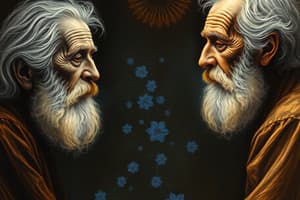Podcast
Questions and Answers
Which theory of biological aging suggests that aging occurs as cells slow their number of replications?
Which theory of biological aging suggests that aging occurs as cells slow their number of replications?
- Wear-and-tear theory
- Cellular aging theory (correct)
- Immunological theory
- None of the above
According to the wear-and-tear theory, what influences the process of aging?
According to the wear-and-tear theory, what influences the process of aging?
- Environmental stress (correct)
- Biological clock
- Cellular replication
- None of the above
What is the main factor that determines the maximum life span and rate of deterioration in each species according to the text?
What is the main factor that determines the maximum life span and rate of deterioration in each species according to the text?
- Cellular replication
- Environmental stress
- Immunological function
- Biological clock (correct)
In which tissues are declines in functional ability greatest with age according to the wear-and-tear theory?
In which tissues are declines in functional ability greatest with age according to the wear-and-tear theory?
What is the primary factor proposed by the immunological theory as a function of aging?
What is the primary factor proposed by the immunological theory as a function of aging?
Flashcards are hidden until you start studying
Study Notes
Cellular Theory
- Aging occurs as cells slow their replication rate.
Wear-and-Tear Theory
- The process of aging is influenced by the accumulation of damage and wear to cells and tissues.
- Tissues that are most susceptible to wear-and-tear include the heart, lungs, and kidneys.
Rate of Living Theory
- The maximum life span and rate of deterioration in each species is primarily determined by its metabolic rate.
Immunological Theory
- The aging process is associated with a decline in the immune system's effectiveness.
Studying That Suits You
Use AI to generate personalized quizzes and flashcards to suit your learning preferences.




